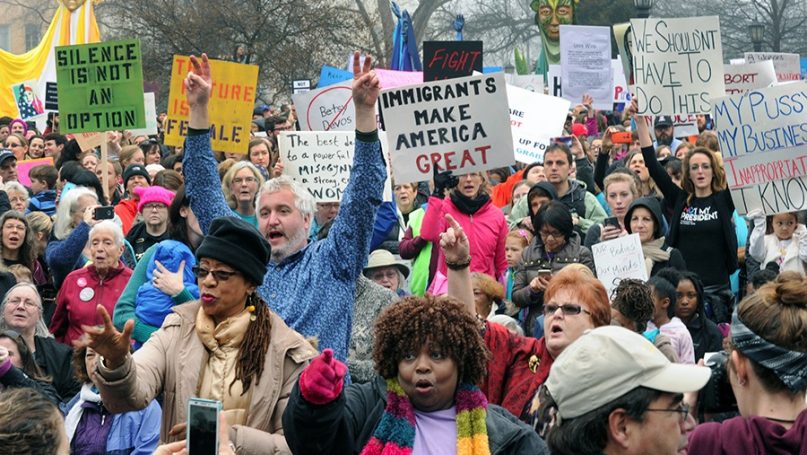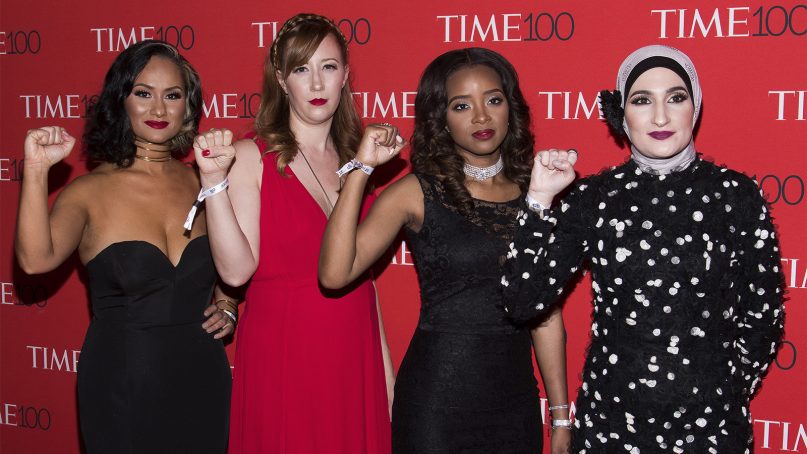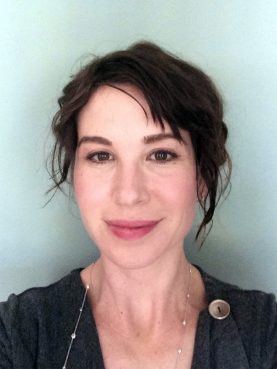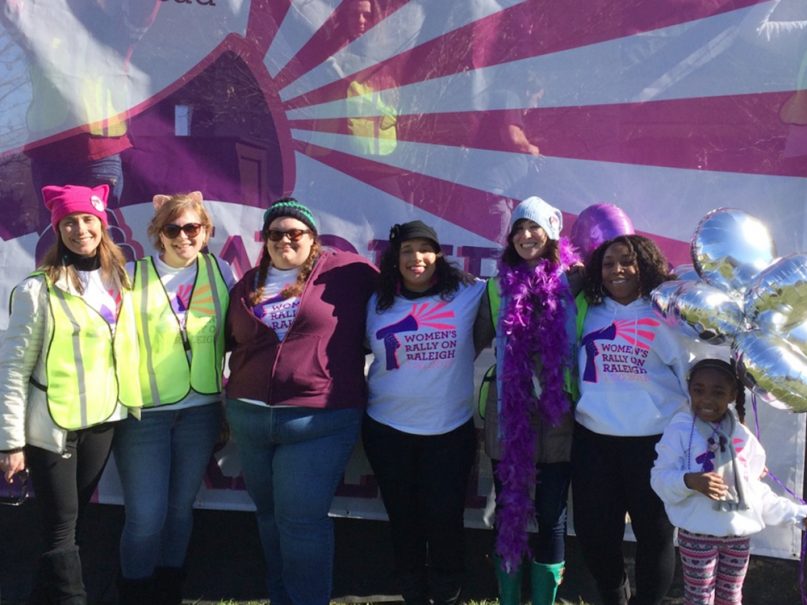
People participate in the first Women’s March in 2017 in Raleigh, N.C. Photo courtesy of Donn Young
RALEIGH, N.C. (RNS) — Shana Becker has much in common with the women who are expected to crowd the National Mall in Washington for the third annual Women’s March.
A lawyer, an activist and a mother, she believes deeply in equality, democracy and women’s rights.
But she’s not heading to Washington for Saturday’s (Jan. 19) march.
Becker, who is Jewish, is helping lead an independent Women’s March on Raleigh a week later in the state’s capital. Like the national march, the Jan. 26 event aims to give voice to those “affected by the current administration and its oppressive policies.”
Like many liberal Jewish women, Becker said she is disappointed by national march board members Tamika Mallory, Linda Sarsour, Carmen Perez and Bob Bland, all of whom have professed admiration for the openly anti-Semitic Nation of Islam leader Louis Farrakhan. Farrakhan has likened Jews to termites, among other things.

Carmen Perez, from left, Bob Bland, Tamika D. Mallory and Linda Sarsour attend the Time 100 Gala, celebrating the 100 most influential people in the world, at Frederick P. Rose Hall, Jazz at Lincoln Center, on April 25, 2017, in New York. (Photo by Charles Sykes/Invision/AP)
“Their acts and omissions with relationship to anti-Semitism distract from the Women’s March and its allies, and cause harm,” Becker wrote recently in an op-ed in the Raleigh newspaper calling on the national march’s leaders to step down.
While Sarsour has walked back some of her statements and clarified her views, Mallory again refused to condemn Farrakhan’s views of Jews during an interview this week on ABC’s “The View,” saying only, “I don’t agree with many of Minister Farrakhan’s statements.”
For Becker, such waffling is unacceptable, though she was heartened to hear that the national group added a steering committee of 32 women, including three Jews.
“I don’t think that it’s OK what the board of the national march has said and not said, done and not done,” said Becker, a Reform Jew and stay-at-home mom who is a former lobbyist for consumer rights and renewable energy.

Shana Becker. Courtesy photo
Becker’s view has been echoed by Jewish women across the U.S., who say they are increasingly uncertain that they can support the movement, despite embracing its larger goals of electing Democratic leaders and building a more inclusive society.
Other Jewish women, however, while acknowledging that there may be some latent anti-Semitism among its leaders, say they will proudly march in the national rally.
Dove Kent, a community organizer, who lives 25 miles away from Becker in Durham, N.C., is one.
“There is never a coalition in which everyone in the group fully understands everyone else,” said Kent. “That’s what the work of coalition building is supposed to accomplish. It’s messy and it’s public and it’s hard. There’s no perfect movement waiting in the wings.”
Kent said that just as it’s taken her 20-plus years to unlearn the racism that imbued her upbringing as a white woman, so it takes time to unlearn anti-Semitic attitudes.
But the controversy has also ruptured relations with typically reliable allies. The Jewish Community Relations Council of Greater Washington has severed ties with the group. On Tuesday, the Democratic National Committee broke with the group.
Emily’s List, the Southern Poverty Law Center and the Human Rights Campaign, which previously sponsored Women’s March rallies on the National Mall, have also pulled back.
The three Jewish women who will now join the national Women’s March steering committee — Abby Stein, a transgender activist; Yavilah McCoy, founder of a group of Jews of color; and April Baskin, who formerly worked with the Reform Jewish movement, the nation’s largest Jewish denomination — reflect an effort to stanch the disaffection.
On Tuesday, a group of mostly liberal rabbis who have championed LGBT rights revealed they had met with Sarsour and Mallory. Nine of the 13 rabbis issued a statement supporting the group.
“We believe there is power and beauty in an intersectional, multiracial, multifaith, women-led movement that is the ideal of the Women’s March,” the rabbis wrote. “We believe the best way to ensure that ideal is to stay in the conversation and work in good faith with our partners.”
The rabbis’ letter, and the new steering committee, come too late for women in Raleigh, San Diego, Orlando and several other cities who will hold their own rallies while making clear they do not affiliate with the national organization.

Some of the lead organizers of the Women’s Rally on Raleigh pose together on Jan. 20, 2018. Photo courtesy of Shana Becker
In New York, there will be two women’s rallies on Saturday — one led by the Women’s March NYC at Foley Square and another beginning near Central Park by the independent Women’s March Alliance. (There’s also a Non-March for Disabled Women.)
“Everybody needs to make their own choice about where they’re comfortable,” said Rabbi Jill Jacobs, executive director of T’ruah: The Rabbinic Call for Human Rights. “The crucial piece is that we all have a responsibility to take some action now because we are in this crisis moment.”
Jacobs said she’ll be in synagogue Saturday because she won’t participate in any rallies on the Sabbath.
Becker, too, said she doesn’t want to judge any Jewish woman who decides to take part in the Washington march.
“The more important message is that women are here to stay as a political force,” Becker said. ” We will keep marching and running and hopefully winning. There will be those among us who say and do hurtful things and that’s just part of the political growing process. It’s not the end.”




